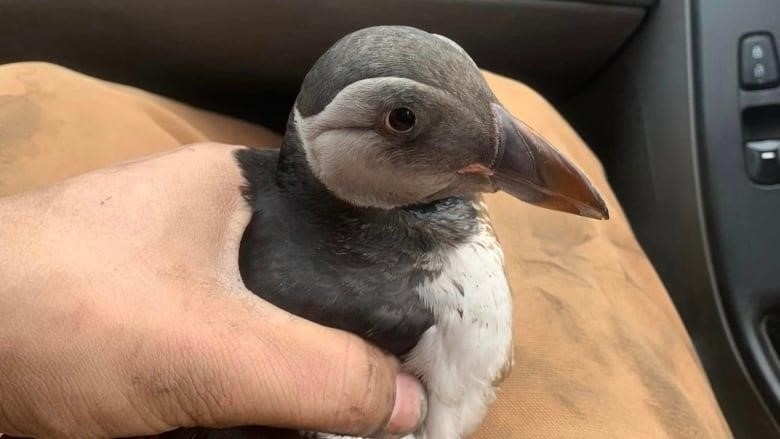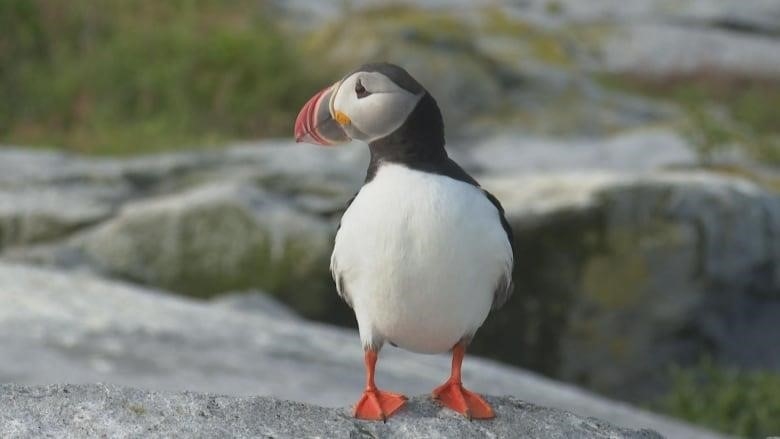
A wildlife expert says, “It’s definitely rare to see an Atlantic puffin this far inland.
A puffin from the Atlantic Ocean got into a bit of trouble when it got lost and ended up on a busy road in New Brunswick. This is not where puffins are supposed to be at this time of year.
David Gordon saw the puffin flapping its wings Thursday afternoon on the busy Coverdale Road in Riverview, near the Gunningsville Bridge.
“My wife was like, ‘That looks like a penguin,'” Gordon said. After he and two other drivers swerved around the bird, he ran into traffic to save it.
Gordon says he picked up the puffin while it was flapping its wings and put it in his car because it looked confused.
“But I didn’t see any blood or wounds that I could see,” Gordon said.

Gordon said that because some birds in the area are sick with avian flu, he and his wife changed their plans and decided to go straight to the nearest vet. During the five-minute drive, the bird sat on his lap and sometimes bit him.
Gordon said, “They were just little pecks, and they didn’t hurt.” “He was looking out the window, which made me feel like I was driving my cats.”
He says he had never seen a puffin before and had no idea what he was holding.
The bird was left at the Riverview Animal Hospital, and from there it was taken to the Atlantic Wildlife Institute near Sackville.
The wildlife care director at the institute, Pam Novak, said, “Finding an Atlantic puffin this far inland is definitely unusual.”
WATCH | David Gordon talks about the time he saw a puffin on a busy street.:
Novak said that when they first got an email about a lost puffin, she thought it was a pigeon because of an auto-correct mistake. She says that this puffin is “rare” and “a mystery bird.”
“We probably haven’t gotten even a handful in the 27 years we’ve been here,” said Novak.
Atlantic puffins usually live on New Brunswick’s Machias Seal Island, which is by itself in the Bay of Fundy. They breed there for a few months in the summer, then leave to spend the winter in the open Atlantic.
It seems strange that an Atlantic puffin would be this far inland, especially in the winter.

“It’s strange, and I’ve been looking to see if there are any other records of them being found in the middle of the country in late winter,” said Novak.
As puffins are very social birds that live in groups, Novak says she has been holding her breath for more phone calls about lost puffins, which could mean that a flock was blown off course by the ocean, but so far, only one bird has been reported lost.
So far, the little puffin is doing pretty well. Novak says that it usually looks a little more dull than people might expect, but that’s normal for this time of year. During mating and breeding season, their candy-corn-colored beak gets brighter, but in the winter, it gets darker.
She doesn’t know what kind of bird it is, but its wings and legs look fine, and it doesn’t seem to have been hurt when it landed on the ground. It’s not hungry, and if it doesn’t show signs of hidden injuries in the next few days, it has a good chance of being released back into the wild.
Novak said, “He seems fine, so I hope we can soon give him a clean bill of health.”
She said that they would set the little puffin free in open ocean water, ideally in a straight line from Machias Seal Island, so that it could find its way back to its colony.
